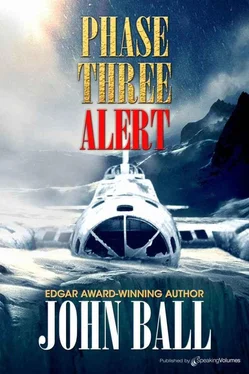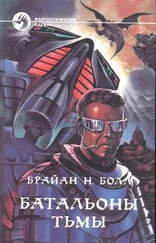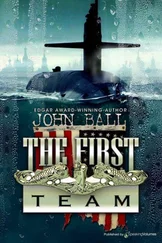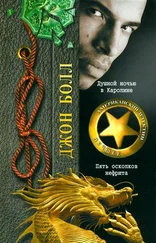“How urgent, sir? He’s on the telephone.”
“ASAP.”
The sergeant disappeared inside and was back in fifteen seconds. He gestured them in. Ferguson forced himself to enter the inner office with decorum; Jenkins was so close behind him they almost collided. Colonel Kleckner, who was still on the line, smiled and waved them to chairs. Ferguson sat down on the edge of his.
For more than another full minute the colonel talked on. Neither of his visitors wanted to listen, but they got the gist of it anyway. McGuire had no better weather information to offer and all flights into northeastern Canada had been cancelled. McGuire had located another Bennett, but it was in use and could not possibly be spared. The search for an available unit was continuing. At last the colonel hung up.
“What’s happened, gentlemen?” he asked.
Ferguson could not help himself; the forced delay had caused emotions to boil up within him that were beyond control. They had been too long suppressed and they almost erupted through his brain. “Sir,” he said. “Read this!” He handed over the message.
Colonel Kleckner scanned it quickly. “I’ve already seen it,” he responded. “I also know you’ve got your aircraft cocked and ready. And Det. Four is all set too.”
“That isn’t it, sir. Look again. It says all available aircraft! ”
The colonel made his decision within three seconds. “Sorry, Scotty, I can’t let you do it. You understand…”
Ferguson’s, eyes blazed. “God dammit, sir, we’ve got to! You know the score: you’ve got five people at least stranded somewhere out on the ice cap and one more here dying in the hospital if she doesn’t get that respirator. The B-17 is low and slow if she wants to be and she’s got the range-more than four thousand miles. That’s twenty hours plus! Det. Four can’t touch that. Sir, you can bust my ass if you want to, but you’ve got to let us go! ”
The colonel didn’t answer; instead he got to his feet. He led the way out of his office, said “Operations” to his sergeant, and paused in the lobby to get into his parka. “Have you got anything new from Weather?” he asked.
“Not yet, sir, any minute — we hope.”
The colonel led the way to his staff car. There was no conversation as the three men got in and none as the colonel made the short drive to the operations building. He parked directly next to the door in the slot that was permanently reserved for him, then went inside.
Fortunately Angelo was bent over the operations counter. The colonel tapped him on the back. “How soon?” he asked.
“Still not good, but substantial improvement in two to three hours, sir — possibly even less. Det. Four wants to go now.”
“Negative. Where’s Major Eastcott?”
“In the C-130 hangar, sir.”
“I’ll be there.”
It still being officially Phase One, the colonel elected to walk the short distance. He entered the hangar and satisfied himself within one minute that every possible preparation had been made. Then he turned to Ferguson. “How long ago since you were in Hangar Eight?” he asked.
That was the fearful question that Ferguson had anticipated — because no one had been in the hangar for weeks, except for a few of the new people who had gone out of curiosity. He stretched the truth as far as he dared. “Not too long ago,” he answered.
Colonel Kleckner gave him a careful look; then he said, “Let’s go and see.”
The three men went outside once more and battled the very stiff wind that was almost roaring down the flight line. Ferguson reached the personnel door of the hangar first and held it open. The colonel stepped inside, closely followed by Jenkins and Ferguson.
The overhead lights were on. In stately dignity the silent form of The Passionate Penguin stood with her wings widespread in the center of the concrete floor. Surrounding her there were at least a dozen men hard at work. One, with a flashlight, was checking the landing-gear wells. Four more were up on the wing checking gas caps and the upper cowl fasteners. As Colonel Kleckner approached the busy scene, Sergeant Feinberg, a confident smile on his massive face, came to meet him.
“Good morning, sir! The emergency supplies are en route; we’ll be loading them within the next five minutes.” He called loudly over his shoulder. “How’s the cockpit check coming?”
“AOK,” someone shouted in reply.
In the long, sometimes brilliant, military career of Colonel James Kleckner there had been many memorable moments, some happy, some not. He had them all impressed on his memory, but none of them had ever matched what confronted him then. He stood still, and he thought.
Sergeant Feinberg caught it and motioned to Ferguson. “May I see you a moment, sir?” he asked. He led the way over to the B-17 and stood under the wing. “My God,” he said, “why didn’t you tip me off! I didn’t get the word until you were practically in the HQ building, and I had to set this up faster than anything I’ve ever done in my life. Actually four of the troops aren’t even mechanics. We had the show going for all of fifteen seconds before the colonel came through the door.”
“Is any of it real?” Ferguson asked.
“Of course it’s real — all but the deadheads. I told them to go up and inspect the gas caps. We’ll redo that, of course.”
“You saw the message?”
“Sir, let’s not waste time with childish questions. The colonel looks about ripe, let’s hit him now.” He strode across the floor. “Sir,” he said to the colonel, “the moment we saw that message ordering all available aircraft to respond, we knew what that meant. Here are the emergency supplies now.” Several more men came in as the door opened enough to admit a pickup truck piled with blankets and other equipment.
The colonel was not impressed; instead he walked over to the B-17 and began to make his own detailed inspection. He spent a full ten minutes. He smelled the fresh oil, checked the inflation of the tires by visual examination, and went over the flying surfaces in detail. By the time that he had finished, a small group of some ten or twelve qualified pilots, three of them civilian Danes, were gathered — watching.
Colonel Kleckner asked for a rag and wiped his hands. Then, quite calmly and in a normal voice, he addressed the men who were waiting breathlessly. “All right,” he said. “In view of the all-important fact that a number of lives are on the line, it’s my opinion that the new order we have received supersedes the old one from Norton. If it doesn’t, they can argue about if afterwards.”
He stopped and looked again at the venerable, yet new, bomber that had been so miraculously resurrected despite its thirty desolate years on the pitiless ice cap. “I see that you have added United States Air Force properly on the sides. That’s important, because I’m sticking my neck out a mile and I know it. Ferguson, can you handle her all right?”
“Yes, sir!”
“Then Boyd will fly the C-130; he and his crew are down there now with Major Eastcott.”
“Yes, sir — we know.”
Sergeant Feinberg cleared his throat. “Captain Boyd is already aware, sir, that he will be taking out the C-130. I understand that Major Eastcott is going with him, as copilot.”
“Speaking of copilots,” Jenkins said, “we’re honor bound to have a drawing. A lot of guys threw dollars into the pot when we needed the money for supplies. Some of them aren’t here any more, but about ten of them are on hand right now.”
“I’m more interested in who’s qualified,” the colonel said.
“Nobody was allowed to contribute who wasn’t,” Jenkins told him. “They wouldn’t take my money, although I have a private license. It had to be commercial or better, with an absolute minimum of six hundred hours. And every man knows the airplane down to the last rivet.”
Читать дальше












